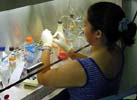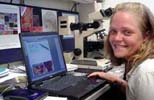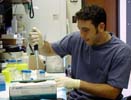Doctor of Philosophy (Ph.D.) Degree Requirements
A unique environment for graduate training in pathobiology and translational science…



General Information
The Pathobiology and Translational Science Ph.D. curriculum is designed to require four to five years to complete. The first two years consist of formal course work, seminars, and introduction to research. Two more years may be sufficient to complete the research project, but additional time, usually no more than 12-18 months, may be required in certain circumstances. Students are introduced to all departmental research programs through seminars at which faculty and graduate students describe their research work. In addition, students gain direct experience in research projects through laboratory rotations with faculty members that are associated with the Pathobiology and Translational Science Ph.D. program. These laboratory rotations are completed during the first year of study in conjunction with the Biological and Biomedical Sciences Program.
Residency Requirement
Each student must complete a minimum of four semesters of residence in the program, which are fulfilled by earning credits through formal graduate courses and research work. A full semester of residence requires nine credits, six to eight credits correspond to one half of a semester, and three to five credits yield one fourth semester of residence credit. At least two of these semesters must be earned through continuous registration at this university.
Courses
The predoctoral training program has a minimal number of obligatory core courses. Because our students begin the program with diverse backgrounds, a specific sequence of courses is structured for each student. Each individual curriculum reflects the student’s career goals and previous educational background, and it is designed to provide a strong foundation in the biomedical sciences to maximize the student’s in-depth understanding of pathobiology. Students who already have a professional degree, or who have taken satisfactory introductory courses as undergraduates or in Masters programs, may proceed directly to more advanced topics in the first year. In contrast, students with recognized deficiencies in their educational backgrounds may receive extra tutorial teaching. Each student’s curriculum will also include special advanced courses in the area of concentration of the student’s research topic. A typical schedule of courses for students with no previous graduate training will include several required courses that are deemed fundamental to developing expertise in Pathobiology and Translational Science.
During the period of course work, students are evaluated by their test scores and final grades. One failing grade (F) or nine credit hours with low passing grade (L) results in loss of the student’s eligibility to continue in the Graduate School. In extenuating circumstances, students dismissed for academic deficiencies may be reinstated after appeal by the student to the Graduate School. In case of reinstatement, the student must repeat the course in which a failing grade was originally received and earn a passing grade (P). Any additional grade below P received by a reinstated student will result in ineligibility.
Research
The laboratories of the Pathobiology and Translational ScienceResearch Faculty offer a variety of research topics, investigative approaches, and experimental model systems, for graduate student research projects. Laboratory rotations are supervised by the Biological and Biomedical Sciences Program during the first year. All students select their area of research concentration and advisor at the end of their first year.
Doctoral Written Examination
At the completion of the course work, the student is required to pass a comprehensive written exam designed to test the student’s breadth and depth of knowledge in pathology, as well as his/her potential to proceed successfully with graduate studies. This exam is offered once a year in the late Spring/early Summer. The examination is organized by a faculty committee and it is based on a pool of questions solicited from the entire graduate faculty in the Department of Pathology and Laboratory Medicine. The same questions are included in every student’s doctoral written exam in a given year. The doctoral written exam includes questions designed to measure knowledge of important concepts in pathology, but also the student’s ability to work out problems, to integrate information, to analyze data, to design experimental protocols, etc. This is a take-home exam containing open-book questions that are answered in the course of three consecutive working days. If the student fails the written examination, he or she is allowed to take it once more, but not until the next year. A second failure automatically results in loss of eligibility.
Dissertation Research Proposal
The major focus of the trainee in the Pathobiology and Translational Science graduate program is the development of research skills. These include design and execution of experiments, critical review of the scientific literature, verbal and written reporting of results and their interpretation. Although this training usually begins at the time of admission to the graduate program, the effort is intensified with the development of a research plan under the direction of the student’s preceptor. The dissertation research proposal is structured in the format of an NIH grant application, which states the goals and significance of the proposed project, reviews relevant literature, develops a strategic plan to approach the problem, and discusses the implications of the expected results. At this time, a dissertation committee is formally nominated by the Director of Graduate Studies (after consultation with the student’s advisor and other members of the graduate faculty) and approved by the Graduate School. This committee is composed of at least five members, including the student’s research advisor, and at least one member with an appointment outside the Department of Pathology and Laboratory Medicine. This extra-departmental member, who is chosen on the basis of expertise in the topic of the dissertation, is included in order to add an independent viewpoint from outside the Pathobiology and Translational Science graduate faculty. The written research project is presented to the dissertation committee and defended during an oral examination. The doctoral committee has the authority to require that additional course work be taken to remedy any deficiency in knowledge detected during the oral examination. If the research proposal is not approved, it must be revised and resubmitted to the committee for approval. When the research prospectus is approved the student is allowed to proceed with Ph.D. studies. During the time of data generation, the dissertation committee is convened once or twice a year for discussion of the student’s progress. These meetings with the dissertation committee are scheduled by the candidate and are essential for the timely accomplishment of the Ph.D. dissertation. Members of the dissertation committee function as major resources for the student’s graduate education, and not simply as final judges of the student’s accomplishments. Students are strongly encouraged to publish their research findings in a timely fashion.
Admission to Candidacy
As specified by the Graduate School, the doctoral student applies for admission to candidacy after he or she has (i) completed all required course work, (ii) passed the written examination, (iii) passed the first oral examination, including the approval of the dissertation prospectus, and (iv) is about to complete experimental work and expects to defend his/her dissertation within the following 12 months.
Dissertation Defense
When the dissertation research is considered complete by both the candidate and the preceptor, the results and their interpretation again may be presented to the dissertation committee for further criticism. At this time, or after additional work recommended by the committee, the dissertation is written, reviewed and approved by the preceptor, and then read by the committee. The inclusion of published manuscripts as chapters of the final dissertation is viewed by the dissertation committee as reflecting excellent to outstanding progress toward the Ph.D. degree. Subsequently, the dissertation is defended by the candidate in a seminar setting before the committee and an audience of interested persons. After a session of private examination of the candidate, the committee approves (or disapproves) the final version of the dissertation. The committee may require changes or corrections in the dissertation before granting final approval. The committee then forwards the signed report of the final oral examination, and recommends that the Graduate School confer on the student the degree of Ph.D. in Pathology.